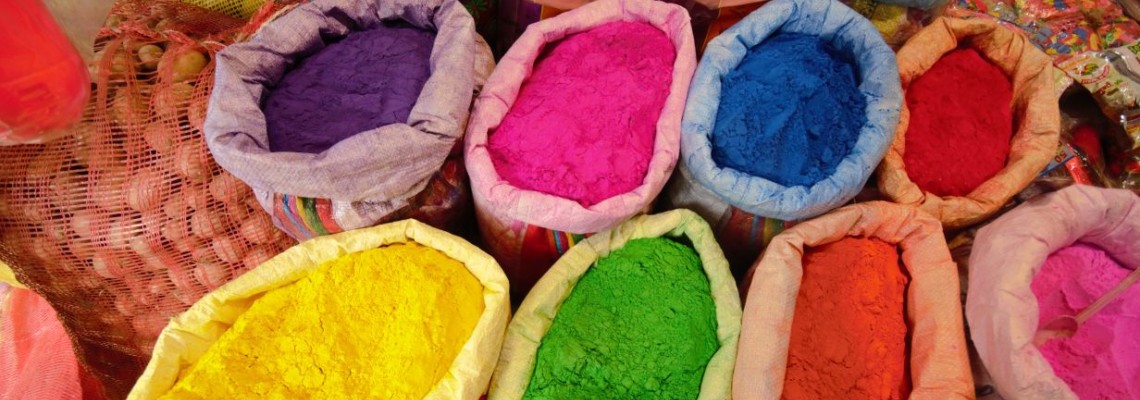
“Ore grihobaasi khol, dwaar khol, laaglo je dol.
Sthale jale banotale laaglo je dol.
Dwaar khol, dwaar khol.”
- Rabindranath Tagore
Holi, the festival of spring, colours and,
love, is celebrated all over the world. This festival signifies the victory of
good over evil. The date normally falls in March, mostly towards the end of the
month. This year Holi will be celebrated on 29th March 2021. On the previous
evening, Holika Dahana or Choti Holi is celebrated where the Holika demon is
burnt. In the Hindu calendar, it falls in the month of Phalguna.
In Bengal it is celebrated as Dol Purnima or
Dol Jatra. The Bengalis worship Radha and Krishna by placing them on a bedecked
palanquin, as they believe, this was the day when Lord Krishna expressed his
love to his beloved Radha. Being a Bengali, living outside West Bengal means
missing out on Dol and fulfilling that space with Holi. Yes, you read it right!
There is a massive difference between Dol and Holi, and it is not just the
names. Dol is the last festival according to the Bengali Year.
You can view a very different Dol in the ISKON
Temples, where Radha and Krishna’s idols are placed on a picturesquely
decorated palanquin; devotees take turns to swing the palanquin with women
singing devotional songs and children dancing around the palanquin. The men
spray coloured water and colours on everyone around. This colour is called
“phag.” After the ceremony is over, everyone indulges in playing with colours.
At this time of the year, you will find foreigners from all over the World
gathered there.
For us Bengalis, Dol comes with a package;
aabir, mishti (sweets) and of course the most important of all Kobi Guru and
his songs, popularly known as Rabindra Sangeet. If you want to see a different
type of Dol, Shantiniketan (Rabindranath Tagore’s Institution) is your
destination. There you can witness the colourful kaleidoscope of the cultural
intermingling of flower petals, floral jewellery on kids and women, the
yellow-red attire, a pinch of pink aabir on cheeks and foreheads, baul songs,
Rabindra nritya, and many more. Being a bong, residing in Mumbai for the last
13yrs, Shantiniketan is my dream destination today.
Here’s wishing you a wonderful and safe Dol
Jatra.
Stay Safe, Stay Healthy
However, we Bongs never fail to bring Bengal
wherever we live, be it Mumbai, Delhi, Bengaluru, or even the United States or
Australia. We enjoy Dol the first day and Holi on the following day. Our
day starts with parents asking their children to change into the oldest dress
we can find in our closet, followed by a wonderful breakfast of luchi
(deep-fried flatbread) and shada aalur torkari (white potato curry). Next, we
prepare plastic bags with pink aabir and are asked to leave the house by the
older ones, as playing with aabir, in the house is strictly prohibited, keeping
cleanliness in mind. Then starts the madness of colours and pichkaris, the
mesmerizing smell of aabir and shiddhi with shondesh. With the music system
playing songs like: Khelbo holi rong debone…, ore grihobashi…., ore bhai fagun
legeche bone bone…., the atmosphere becomes romantic, colourful, fascinating,
poetic. Then a time comes when we are covered in aabir and tired but least
interested in going back home, yet we go home only because a delicious lunch is
waiting on our dining table, mainly basanti pulao and
mutton kosha, followed by mishti doi. We can have the food only after we
clean-up and perform the ritual, i.e., dedicating aabir to God’s idol and feet
of every elder member in the family.
Wait, the day has not come to end yet. In the
evening we visit relatives and friends’ place and the exact steps are followed;
applying aabir at elders’ feet as they apply a tika on your forehead. Every
house prepares food for guests like ghugni, mishiti like gujiya, payesh (Kheer), etc.
The following day is – rango wali holi; with water, colours and pichkaris.
You might be wondering that living in Mumbai
and preparing Bengali food and sweets on a festive day must be tiresome,
sad, and complete waste of time. You cannot be more wrong. Yes, we have Bengali
restaurants that will deliver our favourite food on this day, but two things
you cannot guarantee: first, the prices skyrocket and you can never be sure
that the food packets are not soiled with colours. Yet, we don’t let the spirit
of Dol fade out from our hearts. We are Bengalis; we are known for our
fun-loving attitude, and adda; Dol represents both.
As it was said in the Bengali movie “Bong
Connection”; “A Bengali may stay anywhere in the world, but his/her heart will
always remain in Bengal. They may earn in dollars or pounds but will always
dream of maach, mishti, and Uttam
Kumar.” So, when you find yourself in such a predicament, you know you
have Bangla Konnection to
your rescue.

20 Comment(s)
1
1
1
1
1
1
1
1
1
1
1
1
1
1
1
1
1
1
1
1
1
1
1
1
1
1
1
1
1
1
1
1
1
1
1
1
1
1
1
1
1
1
1
1
1
1
1
1
1
1
1
1
1
1
1
1
1
1
1
1
1
1
1
1
1
1
1
1
1
1
1
1
1
1
1
1
1
1
1
1
1
1
1
1
1
1
1
1
1
1
1
1
1
1
1
1
1
1
1
1
1
1
1
1
1
1
1
1
1
1
1
1
1
1
1
1
1
1
1
1
1
1
1
1
1
1
1
Leave a Comment